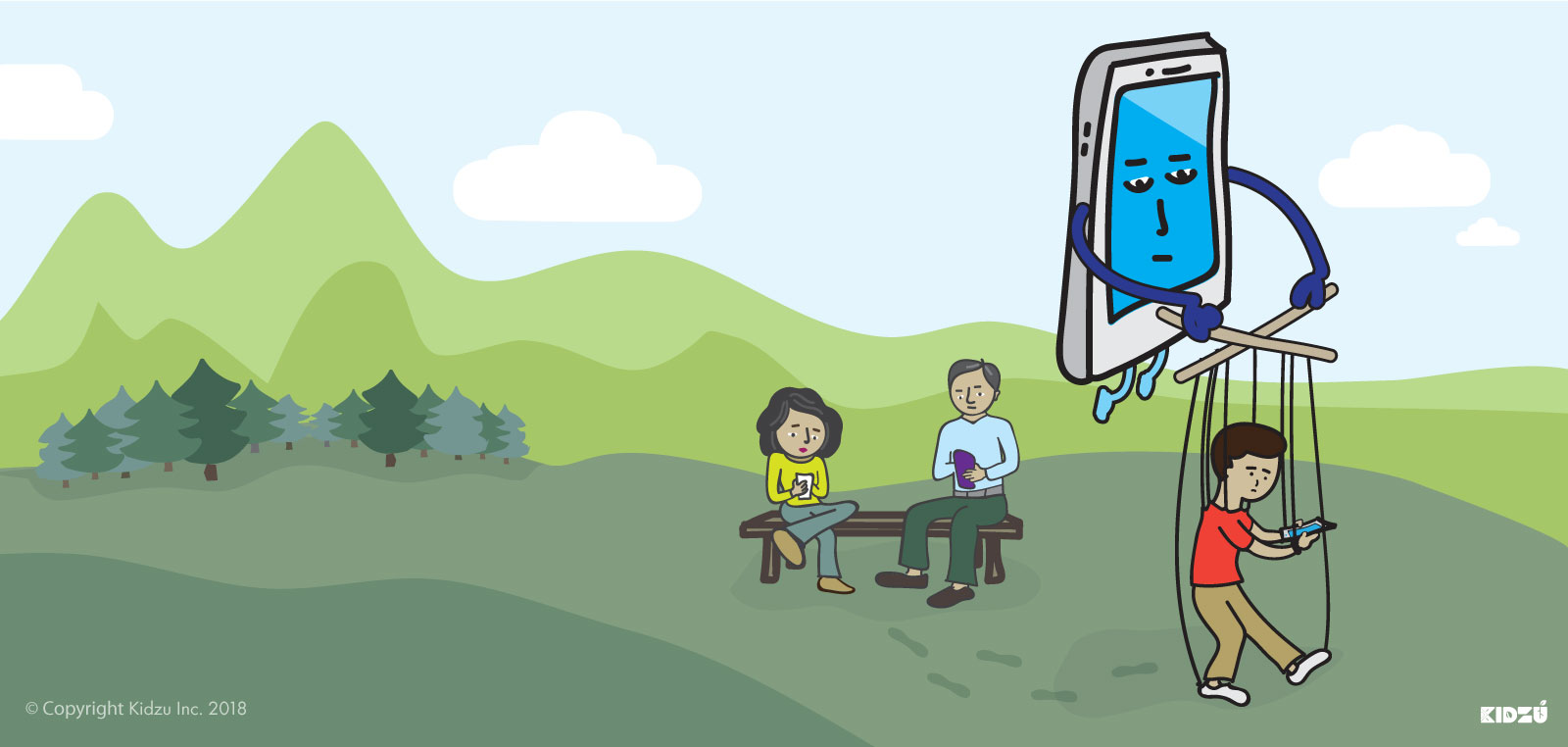Any parent who has been driven half-mad by a child seemingly unable to put down the smartphone or stop playing video games is witnessing the end result of Silicon Valley’s clandestine, multi-billion-dollar effort to make kids dependent on digital technology.
That is the consensus of a growing number of experts, who warn that high-tech companies are using increasingly sophisticated tactics to lure juvenile minds into dependencies on their products and services – minds that are nowhere near mature enough to understand what’s happening to them.
And you, mom and dad, with your own digital dependencies, may very well be aiding and abetting in your children’s addictions – addictions that are showing signs of retarding the emotional, physical, mental, and social growth of your kids.
“Parents have no idea of the powerful forces aligned against them, nor do they know how technologies are developed with drug-like effects to capture kids’ minds,” writes Richard Freed in a must-read essay on the topic. “Parents simply can’t protect their children or teens from something that’s concealed and unknown to them.”
Freed, a child and adolescent psychologist, isn’t alone in his cautions or concerns. There is a growing chorus of voices painting a grim picture of neuroscientists, persuasive design engineers, and technologists collaborating on products and services expressly designed to seduce “the highly malleable minds” of children.
Parents simply can’t protect their children or teens from something that’s concealed and unknown to them.
If all this sounds eerily similar to the more conventional forms of drug addiction parents historically have worried about, you’re not alone. It’s precisely why child development experts increasingly are referring to these technologies as a form of digital heroin.
There are ways for parents – and yes, mom and dad, once again the onus is on you – to fight back, and we’ll get to those in a moment. But first let’s see what, precisely, you and your kids are up against.
A Digital Double Standard
The first thing parents need to understand is that many if not most of the titans of tech restrict their own kids’ access to digital devices.
In his book, ‘Irresistible: The Rise of Addictive Technology and the Business of Keeping Us Hooked,’ Adam Alter notes how often the individuals and corporations “producing tech products are following the cardinal rule of drug dealing: never get high on your own supply.”
Consider, for example, that two of the tech industry’s godfathers, Microsoft’s Bill Gates and Apple’s Steve Jobs, were notoriously strict about their kids’ screen time. Gates’s kids had to wait until the age of 14 for a smartphone, and shortly after the unveiling of his company’s dazzling new iPad, Jobs revealed that his own kids knew nothing about them because he limited their access to technology.

Asked why his kids had limited access to digital tech, former Wired editor Chris Anderson responded that he and his wife “have seen the dangers of technology firsthand. I’ve seen it in myself. I don’t want to see that happen to my kids.”
The same applies to how tech leaders (and the very rich, for that matter) view education.
Note, for example, that Google founders Larry Page and Sergey Brin, Amazon founder Jeff Bezos, and Wikipedia founder Jimmi Wales – attended tech-free Montessori schools. And that much of Silicon Valley’s leadership (and the world’s rich, for that matter) send their own kids to Montessori, Steiner, and other educational institutions that prefer pencil and paper to digital tablet, conversations to smartphones, modeling clay and outdoor imagineering to online gaming.
In their book, ‘Screen Schooled: Two Veteran Teachers Expose How Technology Overuse is Making Our Kids Dumber,’ educators Joe Clement and Matt Miles write: “It’s interesting to think that in a modern public school, where kids are being required to use electronic devices like iPads, Steve Jobs’s kids would be some of the only kids opted out.”
The tech industry follows the cardinal rule of drug dealing: never get high on your own supply.
Ready for another kicker? Even as research demonstrates that those tech leaders are correct and that screens in the classroom really are dumbing down kids, they’re busy selling billions of dollars worth of screens to the taxpayer-funded public school system responsible for educating your kids.
Yes, the irony is staggering: all over the world untold millions of parents are paying for and permitting their kids unlimited access to products designed by people who severely restrict their own kids’ access to them.
And like it or not, these are the hallmarks of shrewd business people who also exhibit strong parenting skills.
What Have We Done?
Like modern-era Dr. Frankensteins, some of those same tech architects are now sounding the alarm about what they’ve let loose on society.
Sean Parker, Facebook’s first president, recently acknowledged in an interview that he has serious concerns about what digital technology is doing to an entire generation of young minds: “God only knows what it’s doing to our children’s brains.”
Tony Fadell, who not only created the Nest thermostat but was instrumental in the design and development of the iPod and iPhone, has confessed: “I wake up in cold sweats every so often thinking, what did we bring to the world?”
All the way back in 2009, Google CEO Eric Schmidt expressed concern that “the sort of overwhelming rapidity of information – and especially stressful information – is in fact affecting cognition. It is in fact affecting deeper thinking. I still believe that sitting down and reading a book is the best way to really learn something. And I worry that we’re losing that.”
I wake up in cold sweats every so often thinking, what did we bring to the world?
Even large shareholders with serious financial stakes in tech stocks are beginning to worry (they’ve got kids and grandkids of their own, after all), with some petitioning tech giants to more carefully consider the implications of their products on young minds.
Your Child’s Brain on Digital Tech
So what is it that all of these tech leaders and investors are worried about? Well, to some degree, the same thing the rest of us are: our kids’ growing obsession with digital tech and the corresponding uptick in rates of childhood depression, loneliness, suicidal thinking, irritability, social awkwardness, obesity, diabetes, anxiety, cyberbullying, lethargy, etc.
And these are just the surface effects. In a 2016 article that drew millions of readers, Dr. Nicholas Kardaras warned parents that these negative behaviors in their kids were symptoms of something more troubling taking place beneath the surface – in particular, their kids’ brains.

Kardaras, an addiction specialist, said imaging studies show distinct similarities in the brains of drug users and those who spend prolonged periods of time gazing at digital screens. Excessive screen exposure, he writes, “affects the brain’s frontal cortex … in exactly the same way that cocaine does.”
Why the similarities? Because “technology raises dopamine levels — the feel-good neurotransmitter most involved in the addiction dynamic — as much as sex.”
Mind you, the frontal cortex is the least developed part of a child’s brain, with construction not completed until well into a person’s 20s. It also governs so-called ‘executive functions’ such as impulse control and planning/organizing skills. Retard the maturation of the frontal cortex and you retard the child’s matriculation into adulthood.
Your kid’s brain in Minecraft looks like a brain on drugs.
Just how powerful are these devices and their content? Kardaras points out that the U.S. military has used video games as pain killers for soldiers wounded in combat. One officer who suffered 3rd degree burns over 30% of his body from an IED in Afghanistan, told Kardaras that a video game was a more effective pain killer than morphine.
Kardaras’s message to parents: “Your kid’s brain in Minecraft looks like a brain on drugs.”
How Are They Doing It?
Not long ago Facebook’s Parker admitted that during the company’s early days, product designers were trying to determine how to design a system that would “consume as much of your time and conscious attention as possible.”
To do that, he said, meant “we need to sort of give you a little dopamine hit every once in awhile, because someone liked or commented on a photo or a post of whatever.” In a nutshell, said Parker, they were “exploiting a vulnerability in human psychology.”

Those dopamine hits are precisely what the gambling industry engineers into its most profitable product, the slot machine, says Tristan Harris, a former Design Ethicist at Google. Which is why Harris likens smartphones to slot machines, because they dole out ‘rewards’ to keep a user hooked (except that the currency in question is composed of digital Likes, Follows, Shares, Comments, etc., versus coins).
In a CNBC interview, Salesforce CEO Marc Benioff acknowledged that “technology has addictive qualities that we have to address, and that product designers are working to make those products more addictive and we need to rein that back.”
Read that last sentence again: product designers are working to make those products more addictive.
And those addictive properties aren’t just working on kids. Adults also are succumbing to these high-tech seductions.
But for Freed and other child development experts like him, it is one thing for a fully-formed, discerning adult to fall pray to the tech industry’s ‘dark designs‘ – quite another for that same digital alchemy to be used on immature juvenile minds.
“What these parents and most of the world have yet to grasp is that psychology — a discipline that we associate with healing — is now being used as a weapon against children,” writes Freed, who sees evidence of this tech addiction every day in his own practice.
The Face of Digital Addiction
Last September, Jean Twenge, a professor of psychology at San Diego State University, warned in an Atlantic piece that smartphones may be destroying an entire generation of kids – a generation she labeled ‘iGen.’
What Twenge, and others who study kids have noticed, was a radical change in thought and behavior patterns in kids at precisely the same time smartphones and other digital screens became a commonplace in American homes.
“The arrival of the smartphone has radically changed every aspect of teenagers’ lives, from the nature of their social interactions to their mental health,” wrote Twenge. “These changes have affected young people in every corner of the nation and in every type of household. The trends appear among teens poor and rich; of every ethnic background; in cities, suburbs, and small towns. Where there are cell towers, there are teens living their lives on their smartphone.”
Teens who spend more time than average on screen activities are more likely to be unhappy, and those who spend more time than average on non-screen activities are more likely to be happy.
While digital addiction has led to some positives in childhood statistics – kids remaining glued to their screens at home equate to fewer problems with drugs, alcohol, automobile accidents, early sex, etc. – the negatives, to Twenge and others like her, far outweigh the positives.
Yes, kids are safer being home, she says, but that also means they’re spending less and less time with other kids in face-to-face interactions (where critical life skills are developed); aren’t dating or courting as they enter their teens; are waiting longer and longer to secure driver’s licenses; aren’t moving out into the world to attend college or get a job (remember the earlier caution about the frontal cortex tied to the maturation process?).
In short, kids aren’t growing up.

“The twin rise of the smartphone and social media has caused an earthquake of a magnitude we’ve not seen in a very long time, if ever,” writes Twenge. “There is compelling evidence that the devices we’ve placed in young people’s hands are having profound effects on their lives—and making them seriously unhappy.”
Citing annual survey data from the National Institute on Drug Abuse, Twenge says the message could not be any clearer: “Teens who spend more time than average on screen activities are more likely to be unhappy, and those who spend more time than average on non-screen activities are more likely to be happy.”
Some specifics include:
- Teens who spend 5+ hours on devices are 71% more likely to have a risk factor for suicide and more than half will sleep fewer than 7 hours per night at an age when healthy body and brain development often requires much more rest.
- Reports of self-inflicted injuries such as cutting have gone up nearly 20% in girls ages 10 – 14 since 2009.
- Boys’ depressive symptoms increased by 21% between 2012 and 2015; girls’ grew by a whopping 50%.
- Three times as many girls ages 12 to 14 killed themselves in 2015 versus 2007.
- There is a direct correlation between social media usage and feelings of loneliness, anxiety, and depression (in adults too).
What Can Must Parents Do?
To addiction experts like Dr. Kardaras, the first and most important step “is to prevent your 4-, 5- or 8-year-old from getting hooked on screens to begin with. That means Lego instead of Minecraft; books instead of iPads; nature and sports instead of TV.”
But to most child development and technology experts, it begins with parents setting a good example for their kids. Something that, to reiterate, tech leaders already are doing with their kids because they understand the risks.

To Sherry Turkle, an MIT professor and author of ‘Reclaiming Conversation: The Power of Talk in a Digital Age,’ parents need to exercise self-control when it comes to their use of smartphones, social media, and even video games. “Many of us,” she writes, “aren’t exactly paragons of virtue in this arena.”
In one passage from her book, Turkle shares the rather dismal hopes of a 15-year-old boy, who told her he “wanted to raise a family not the way his parents are raising him (with phones out during meals and in the park during his school sports events), but the way his parents think they are raising him – with no phones at meals and plentiful family conversations.”
Fellow parents, it’s time for us to consider another possible explanation for why our kids are increasingly disengaged. It’s because we’ve disengaged ourselves.
Similarly, Alexandra Samuel, who researches, writes, and speaks on the topic of technology, says the issue isn’t so much with kids and tech – it’s with their parents. “Fellow parents,” writes Samuel, “it’s time for us to consider another possible explanation for why our kids are increasingly disengaged. It’s because we’ve disengaged ourselves; we’re too busy looking down at our screens to look up at our kids.”
Samuel, who thinks some of the concerns over kids and digital tech is overblown, urges parents to become conscious custodians of digital technology in their homes and to help guide their kids’ relationship with technology. (Samuel, by the way, isn’t alone in thinking the fears about kids and tech are overblown. Here’s another of those voices.)
Walter Isaacson, who wrote what many consider the definitive biography of Steve Jobs, said Jobs made it a point of having screen-free dinners with his family, during which they would discuss all manner of topics. Simply put, Jobs was practicing good parenting.
Last year, Bill Gates’s wife, Melinda, penned a piece for the Washington Post in which she confessed that, if she had to do things over again, she “probably would have waited longer before putting a computer in my children’s pockets.” To Gates’s way of thinking, childhood can be difficult enough without the added complications of 24/7 social media connections and omnipresent technology.
All of the child development and technology experts do seem to agree on certain steps parents can take:
- Become a technology role model for your kids. If your kids see you read books, listen to music (or play an instrument), go for hikes, garden, and otherwise engage in technology-free behaviors, they’re more likely to follow suit.
- Get your child outdoors on a regular basis where their imagination can come to life
- Ensure your children are engaged in outdoor and face-to-face activities where they can develop social interaction skills, empathy, and other tools for adulthood.
- Hold technology-free dinners. No screens, no smartphones, no TVs – just food and conversation.
- Get your kids involved in extracurriculars – the arts, sports, outdoor life. Idle time after school and on weekends is precisely what kids will fill with technology.
- Ban all screens from children’s rooms, including TVs.
- Do not place digital assistants in your kids’ rooms. Ever.
- Set firm limits on which devices can be used, which content can be consumed, and how long they can be used/played.
If your child is already ‘hooked,’ consider one or more tech-free camps as forms of ‘digital detox.’ One study showed that after just five days kids experienced ‘significant improvement’ of their nonverbal emotional cue recognition (i.e. they were more empathetic).

In fact, many kids as well as camp directors and counselors, report that once kids become accustomed to their new tech-free experience, they report being genuinely happy. Some even rue their imminent return to ‘real life.’
One impediment faced by many camps? Says Barry Garst, who studies youth development at Clemson University: “We started to hear from camp directors a number of years ago that parents were the most problematic areas of a camp experience.”
So there it is, mom and dad. You are up against the behemoth otherwise known as Silicon Valley and its digital seductions. Given what we know about child development, NOW is the time for you to roll up your sleeves, set down the smartphone, turn off the TV, close the laptop, and reengage with your kids – regularly, actively, directly – so that they, ironically enough, enjoy the same opportunities in life as do the offspring of Silicon Valley’s executives.

